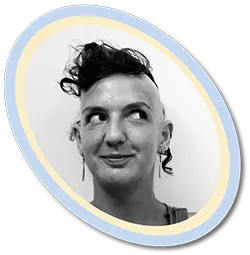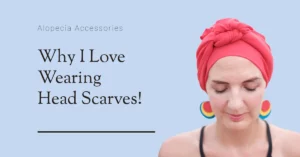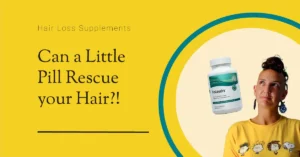

When you’re diagnosed with alopecia, you start to ask certain questions. ‘Why me?’ ‘What caused my hair to fall out?’ ‘Will it grow back?’ And if you don’t have a clear reason for alopecia, it can make the whole thing a lot more frustrating. But understanding it can be a major step towards acceptance.
So let Lady Alopecia shed a little light on the subject. (I’m pretty good at shedding. Ask my hairbrush.)
Read on to discover what causes alopecia, and how you can minimize damage.
Coming up:

Emma’s ‘not a doctor’ disclaimer
Hi there, I’m an alopecian, I’m not a doctor! Any advice I give is based on my own research and personal experiences. This site is, however, reader-supported. When you buy through external links, I may earn a tiny affiliate commission. Learn more here.
The books will tell you that alopecia is an autoimmune disease, which attacks healthy hair follicles and causes hair loss. (I don’t like to call it a ‘disease’. So I’ll use ‘condition’ instead).
Alopecia is a non-threatening condition. Or so they say. Still, while it may not be fatal, alopecia can have pretty serious mental and emotional consequences – like a loss of self-esteem, increased anxiety and depression.
Experiencing alopecia can be a scary, isolating thing.
Aside from the shock of seeing your hair fall out, you don’t know what caused it, whether it’ll get worse and what you can do about it. So it may not threaten your life – but it can certainly destroy its quality.
Just like other autoimmune diseases, alopecia starts when the immune system mistakes healthy cells for foreign invaders. (How rude.) And since our white blood cells are actually built to fight the unfamiliar, well, they’re just too good at their job!
And so the same things that valiantly defend our bodies against viruses and bacteria suddenly turn on our innocent hair follicles, attacking groups of the helpless fellas at a time.
In response, the follicles shrink dramatically and stop producing hair above surface level for months – or even years – thereafter. This leads to the kind of patchy hair loss that’s associated with alopecia.
Unfortunately, researchers don’t seem to know what triggers this attack on our immune system. But they do offer up a few suggestions…

Alopecia is most common in people who have a family history of other autoimmune diseases – so yes, genetics can play a part. It’s a ‘polygenic’ condition, meaning it needs several different genes to be contributed from both parents to come into being. (Thanks, parentals!)
Plus, certain external/environmental factors can trigger alopecia in people who are predisposed to it.
In my own experience, I first noticed my alopecia around the age of 10, after my mother’s death. (From Lupus. Another autoimmune disease.) Obviously, this was a very traumatic time in my life and whatever doctors I saw for years afterwards attributed my hair loss to the resulting stress.
But the alopecia could’ve been in my make-up long before this. When I was a toddler, I apparently had a coin-sized patch on the back of my head. So even at that early age, my immune system wasn’t working in my favour.

The human body is a complex thing and it relies on balance. In terms of blood pressure, blood sugar levels and hormones, too much or too little can affect us in different ways.
Hormones are particularly potent things. They’re known as ‘chemical messengers’, which travel through the bloodstream and do their work on various body tissues so that they can function properly.
But if the message gets lost in translation, well… then you’ve got a problem.
For instance, too much testosterone can cause frontal balding, in both women and men. Still, we need a certain amount of it to produce new cells, to stimulate follicles and to keep our adrenal glands in check (more on those later).
On the other hand, too much estrogen can also result in hair loss, blood clots, strokes and certain forms of cancer. Yikes. But since it plays a key factor in reproduction, it’s important to have enough of it.
Basically, when our hormones are out of whack, things get complicated.
Some female alopecians find that going on the contraceptive pill helps them to regrow hair. Others say that it actually caused their alopecia in the first place, thanks to an over-sensitivity to the androgens (or male hormones) in birth control options. Some find that alopecia disappears with pregnancy; others find that it starts during menopause.
Confusing, right?! Frustrating? Definitely.
I’ve been told by various doctors that a) my testosterone levels are too high and b) they’re too low. Consequently, some have advised me to go back on the contraceptive pill; others have warned me away. (I had my IUD removed for this very reason years ago. It didn’t make a difference).

Problems with the adrenal glands can be another big reason for alopecia. These grape-sized glands come in twos, with one snugly attached to the top of each kidney. Weighing in at only 4–5g, these little fellas have a pretty big job to do: to release cortisol and other hormones into the bloodstream.
This produces the adrenaline rush that fills our bodies in times of challenge or excitement. It can be a great motivator or a massive stress factor, depending on the situation.
The adrenals were built to help us deal with immediate threats.
But they’re not designed to deal with prolonged periods of stress and so, when faced with the daily challenges of the modern world (bad traffic, missed deadlines, loud noises, extreme weather) and bigger traumas like illnesses or death, they grow fatigued. They fail to produce enough of other hormones (like testosterone and its precursor, DHEA), which can lead to hair loss.
Of course, the adrenals can also come under stress through more unnatural means. In my case, I was exposed to pretty high levels of the steroid cortisone when in the womb (my mum had to take it for its anti-inflammatory properties).
Consequently, as one nutritionist told me, my adrenal glands never quite learned how to produce the stuff naturally. And so for years, cortisone shots were my most effective treatment for alopecia. (Until I became immune to them, too.)

Since alopecia is caused by an inflammatory response, reducing this inflammation can lessen the damage. So while sticking to an anti-inflammatory diet might not help your hair to grow back, it could stop the situation from getting worse.
In any case, it gives you the feeling that you’re taking control of your alopecia, rather than the other way round. And Lady Alopecia is all about telling alopecia who’s boss!
Foods to avoid:
Some nutritionists recommend cutting down on meat and cutting out dairy altogether (because of their saturated fats, which can increase the inflammatory response). Milk, in particular, contains the protein ‘casein’ – which can irritate the immune system.
Note: Alopecians with low calcium levels will need to source it elsewhere. They should opt for dark leafy greens and tofu, or take it as a supplement.
But the main culprit in this case is gluten. Why? Well, gluten can both trigger and further inflame the autoimmune response, even if you’re simply ‘gluten-sensitive’ rather than a full-blown celiac (which is rarer).
If you experience bloatedness, cramping or digestive problems after eating it’s highly likely that you’re sensitive to gluten. It only causes your immune system to attack itself even more – so alopecians should probably reduce their intake, or cut it out for good. (Sorry!)
Foods to increase:
Now, I’m not telling you to avoid fat altogether. Fat is great… as long as it’s of the healthy variety.
In fact, healthy fats can reduce the inflammatory response in the body. So try cooking with olive or coconut oil, eat plenty of Omega 3-rich foods like salmon, tuna and mackerel and always have a supply of nuts and seeds to hand. Walnuts, sesame seeds and flax seeds are great!
Note: If you have what’s known as ‘leaky gut’, you’ll want to avoid nuts and seeds altogether. First you need to heal your gut, then you can focus on the other dietary elements to help with hair growth.
You could also turn to antioxidants to boost that weary immune system. Whether it’s in the form of green tea, or turmeric, or plenty of fruit and veggies, kick some oxidant ass!
Please note: I’m by no means a nutritionist – I’m simply sharing what I’ve heard and what I’ve experienced myself. I do eat meat on occasion and although I don’t drink dairy anymore, I may dip into it in the future. (Not literally.)
Here’s what’s worked for me: Eating lots of leafy greens, cutting out processed food whenever possible, ditching gluten and watching my caffeine and sugar intake. My adrenals seem to respond in crazy ways to a single cup of coffee – shaky hands and pounding heart central – so much as I love the stuff, I try to avoid it.

Ahhhh, stress. The catch-all term that’s given to us alopecians by hairbearing chaps with prescription pads and understanding head tilts.
‘Try not to worry about it. Stress will only make it worse.’ It might be true, but it isn’t the most reassuring advice. I mean, a fist-sized patch has appeared on the back of your head, clumps of hair are falling out in the shower and you’re meant to act like nothing’s wrong? Pfft! is what I say to that. Pfft, indeed.
The s**t thing is, if your alopecia is indeed stress-related, watching more and more fall out is obviously going to stress you out further. As will worrying whether your patch is on show after a gust of wind blows your carefully arranged clips or your wig apart. And as will desperately checking the bathroom mirror every 5 minutes in the hopes of seeing some fuzz appear.
Having lived that life for years, I got sick of the stress that alopecia was causing me. So I shaved the rest of my hair off, ditched the wigs… and have been a lot calmer since.
It’s that control thing I mentioned before; of not letting my condition win. I’ve also turned to mindfulness meditation as a stress reliever and for the past few years, while life hasn’t been stress-free, it’s been far from stressful.
I talk about meditation more in this post. Or check out either Jon Kabat Zinn’s science-based introduction to the practice or this great 8-week course by Danny Penman & Mark Williams. I read the first book and listened to the second on Audible – within just a week I was feeling calmer, more mindful and less stressed.
The good news is that no, it doesn’t have to be.
Because even though the production stage may slow down for several years, and even though the patches might extend, those hair follicles beneath them are still alive. And they’ll start growing hair again once they feel it’s the right time to do so. Your patience will be rewarded eventually.
Well, after all that, unfortunately I can’t give you a clear reason for alopecia. Sorry. It’s one of the most frustrating things about having the condition. And because you can’t be sure what causes alopecia, it’s harder to a) slow the rate of hair loss down or b) prevent it in the first place.
But hopefully you’ll now have some indication as to what could make the problem worse. Like if you have a very stressful work life, and you drink 4 cups of coffee a day and you rarely eat vegetables… well, there’s definite measures you can take to help both your hair and your health.
Remember, we alopecians have a weaker immune system than many, so it’s important that we look after ourselves. Eat the right foods, exercise regularly (but not too much!) and get plenty of sleep.
Check out more posts on Lady Alopecia for tips on all of the above and if you have any advice to share yourself, please get in touch!
Get free, semi-regular alopecia-related news things and musings.
Psst… If no welcome email shows up, check your spam.

Alopecian. Yoga Teacher. Copywriter. Here to share information, offer support and show people the adventures that can lie in hair loss. I’m proud to have alopecia and I want to help others embrace their baldness, too!





Every month, thousands with hair woes visit my site. The more the merrier! But it takes AGES to write posts and reply to emails. Don’t get me wrong, I love it! But running a website isn’t free. So I’m trying something new: I’m asking for your support. If Lady Alopecia has helped you, please consider buying me a (virtual) coffee or even become a patron of the site. Thanks!
I’m Emma. I’ve had alopecia for 24 years and I’m here to inform/hopefully empower people like me! Read my full story here. But I’m not a doctor, so any advice here is based on my own research and experience. I’m also in a few affiliate programs – see my disclaimer page for more. Or contact me here. Also, why not join a thousand fellow alopecians and get my-semi regular hair about life with irregular hair?
Psst… If no welcome email shows up, check your spam.

Small print time: Ladyalopecia.com is a participant in the Amazon Services LLC Associates Program, an affiliate program designed to provide a means for sites to earn advertising fees by advertising and linking to Amazon.com.
Copyright © 2023, Lady Alopecia. All rights reserved. Important – By using this website, you promise not to steal stuff. Thank you kindly.
Just stick in your email to join the gang.
If no welcome email appears, please check your spam. Oh, and don’t worry, I won’t give your details to Zuckerberg and you are free to unsubscribe at any time.
Join the gang and receive semi-regular news and joy from someone with very irregular hair.
16 responses
I found your blog a year ago and somehow your email stayed in my archived mail for over a year. Anyway very happy to find it.. got lots of reading to do. I’ve been suffering from alopecia for about a year.. taking lots of supplements with no help. My nails grow like weeds but my hair just won’t grow. I have hair in the back and that’s about it. Anyway so happy to have found you and you’ll be hearing from me again soon!
Hi Lisa, thanks for your lovely comment – I really hope you find my posts helpful and that you find the support/information you need here. Take good care of yourself! And happy reading.
Emma / Lady Alopecia x
I am so incredibly grateful I found you!! This is my 2nd round; first time was about 6 yrs ago but this time is worse and I’ve been struggling emotionally. It took over a year last time but my hair did grow back – although, never as thick as it was. And I’m all too aware that it may not grow back this time (genetic gift; a few family members have had in the past but most were men and embraced the bald look – so much easier when they have a great shaped noggin). I know having a plan and gaining control will help alleviate that stress and your blog has officially become part of my regular reading and resource gathering. Muchos Gracias!! dy xoxo
Thanks for the lovely feedback! Although I’m so sorry to hear about your 2nd round of alopecia…it can be such a frustrating thing, especially when it comes back after a time of complete regrowth! It seems like you have a great attitude though and you’re right…finding a way to take control of it rather than the other way around will make all the difference! As will sharing your experiences and learning from others going through the same thing. I’m so happy to hear you’ll be following my website and feel free to join my newsletter also, if you haven’t already!
Take care xo
Really enjoyed ‘why me? Why my hair?’. As someone who began losing their hair at 11 and is now 29 I found it very interesting! Thank you! I will be taking things into consideration for my own life and future. I will also be reading more if your articles!
Hi Daisy, thanks so much for your lovely feedback – and I’m really sorry to hear about your long struggle, I know what it’s like to get it at such a young age and it’s not fun! But the years and the experiences I’ve had along the way have helped me accept it…sometimes I even feel grateful for this thing that makes me different!! I hope you enjoy reading my other posts and please don’t hesitate to get in touch if you need any further information. You’re welcome to join my newsletter if you’d like, too! 😉
All the very best xx
Great to find your blog I’ve been AU for 18mths and it’s a very hard journey Great to realise I’n not alone Thankyou
Hi Rita, thanks so much for your lovely message. And I’m so sorry to hear about your AU – but you’re right, you’re not alone! There’s a wonderful community of alopecians out there who can support you. I’ve recently connected with plenty of them on Instagram and it’s the most empowering thing! You’re welcome to join my newsletter too, if you like, to receive the latest updates from the community! I really hope this site will help you out with a little support and hopefully the occasional laugh now and again. Take care, and mind yourself, Emma x
Hey – I love reading your blog and came across it randomly. I am a male that suffers from alopecia. My first bald spot was in grade 8 and it grew back a few months later. In 2013, my sister passed away suddenly and i took on a new job (dumb I know) and I developed 3-4 bald spots on my head. However, over 2 years – those spots eventually went away. Now, in 2019, I’ve had huge stresses for the last 2 years and my whole head is now bald. At the beginning of August, i started to lose eyebrow hair and now I’m pretty much down to 30% of my eyebrows! Additionally, my body hair is all starting to go agressivvely. I started on prednisone (steroids) but it made me go crazy so I’m slowly tapering off. It has slowed down the hair loss though may not have eliminated it completely. I am worried (i know I shouldn’t be) that I maybe going into Alopecia Universalis but I am wondering if because I’ve had hair re grow in the past, if I can get my stress, hormones and eating/physical activity under control if I can combat this! Any thoughts would be appreciated…
Hi there. Thank you so much for sharing your story, it’s a really great thing to have the courage to reach out for support. I’m also so sorry you’ve had such a tough time of it and especially that grief manifested itself in this physical way. It was the same case with me and like you, my hair did grow back for a while but started coming out more aggressively years later. I would definitely avoid whatever steroids are prescribed to you. They might treat the initial symptom but they don’t address the core of the issue and even worse, you might end up doing more damage to your immune system down the line. Try not to worry that it might develop into AU (easier said, I know!) but sometimes my own eyebrows also shed (mainly my right one) but it’s stopped there (well, in addition to the patches!) Almond oil applied to eyebrows daily can make a big difference. It seems like you’re on the right track now regarding stress, hormones and exercise etc. To bring down inflammation and (which triggers the autoimmune response), I’d highly recommend meditation, gentle yoga (especially yin), cold water therapy – eg blasting the cold water for the last 2 minutes of your shower! Also see if going off gluten and dairy for a couple of weeks (if you can!) helps. Check out my post on nutrition tips, with some links to more information. Also, I’ve just seen an FM (Functional Medicine) doctor and I’m awaiting results. But I’m expecting she’ll have a lot of sound advice regarding diet, supplements etc. I’ll be posting about it when I know! Again, thank you for sharing and I really that these more holistic approaches will help you.
Hi. I’ve just come across your blog. I am a 14yr girl. I have had Alopecia Areata since I was 11. Currently I am missing all of my hair from the back of my head, a massive palm size spot from the top of my head, and a drastically receding hairline.
I’ve started to wear a wig recently. Not because I’m being bullied (all my classmates are very supporting and accepting and I am lucky), but because I was self conscious. Finding your blog has helped me regain some lost mental ground from Alopecia. Thank you so much.
Hi Tegan,
It’s so wonderful that you reached out this way, thank you for your message. I’m so sorry that your alopecia has spread this much, it is very similar to my own experience at your age and I know how tough it is to go through. But I’m really glad to hear that your classmates are supportive, that’s brilliant! And I’m also happy that you’ve found comfort in wearing a wig – it wasn’t for me in the end but I totally get that the choice to go wigless isn’t for everyone. It sounds like you’ve reached a good place, being able to talk to classmates about it and having the courage to post your message here… so well done, you! Thank you for your kind words and I’m sending you lots of fellow alopecian love. Take care xxx
Thank you so much, I cant tell you how much I appreciate finding this after developing alopecia nearly a year ago. Makes me feel like I’m not on my own at last after feeling completely isolated most of this year
Hi Jan, thank you for your lovely comment. In fact, that’s why I set up Lady Alopecia – because I felt SO alone when I first developed alopecia, and I felt that no one understood what I was going through. I believe that the more we can talk about our experiences and share our frustrations/fears etc, the more healing it promotes. So please feel free to get in touch with any further comments or questions – I’d be happy to help in whatever way I can. xxx
Just thank you. I’m starting on this journey and the panic, the loneliness, the anger everything. Just thanks
Hi Fi,
Thanks for your message, it means a lot. And I’m so sorry that you’re going through this…I know how scary it can be. But you really don’t need to feel like you’re alone – try checking out some of the forums on alopeciaworld to chat with other alopecians. Or feel free to ask me any questions if you like. I’ll try and help in whatever way I can. Keep strong, and smiling! 🙂